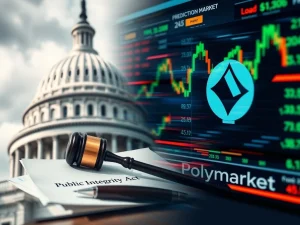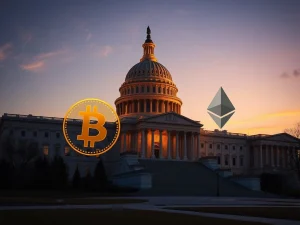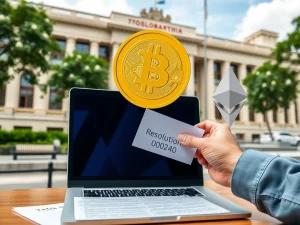Shocking El Salvador Bitcoin Revelation: IMF Unveils Halt in Crucial Purchases

A significant development has emerged from the financial world, casting a new light on El Salvador’s much-publicized Bitcoin strategy. The International Monetary Fund (IMF) has released a report stating that El Salvador has not acquired any new Bitcoin since signing a crucial loan agreement in December 2024. This revelation directly contradicts ongoing claims from El Salvador’s own Bitcoin Office, which has regularly posted about daily Bitcoin purchases. This disparity raises important questions about the country’s digital asset reserves and its financial commitments.
IMF El Salvador Report Unveils Contradictions
The recent report from the IMF, published on Tuesday, details the ongoing loan agreement between the international body and the Central American nation. At the heart of the report is a critical finding: El Salvador has not made any new Bitcoin purchases since the loan deal was finalized in late 2024. This directly challenges the narrative consistently put forth by El Salvador’s Bitcoin Office, which often suggests a steady accumulation of the digital asset.
Key points from the IMF report include:
- The Chivo Bitcoin wallet, El Salvador’s official digital wallet, does not adjust its Bitcoin reserves to reflect changes in client deposits.
- Chivo’s operational model does not involve selling its Bitcoin, leading to ‘minor’ discrepancies that previously made it appear as if the public sector was actively accumulating BTC.
- A letter of intent, signed by high-ranking Salvadoran officials, explicitly confirms that the ‘stock of Bitcoins held by the public sector remains unchanged.’
This letter, signed by Douglas Pablo Rodríguez Fuentes, El Salvador’s central bank president, and Jerson Rogelio Posada Molina, the minister of finance, further states: ‘we are taking steps to mitigate fiscal risks by reducing the public sector’s role in the Chivo wallet and reframing the Bitcoin project.’ This commitment underscores a strategic shift away from direct public sector involvement in Bitcoin accumulation, as agreed upon under the IMF program.
The $1.4 Billion Loan and Bitcoin Policy Shifts
The background to this unfolding situation is the substantial $1.4 billion loan deal El Salvador secured with the IMF in December 2024. A key condition of this agreement was that El Salvador would scale back its direct involvement in Bitcoin. Following this, in January 2025, El Salvador’s legislature revised its Bitcoin laws, making the acceptance of BTC as legal tender voluntary rather than mandatory. Furthermore, the government also agreed to cease accumulating BTC using taxpayer money.
Despite these formal commitments, El Salvador’s Bitcoin Office continued to assert that the government was steadily accumulating BTC. This ongoing claim created a direct conflict with the terms of the IMF deal, leading to increased scrutiny.
The tension escalated in March when the IMF issued another notice to El Salvador, urging it to halt Bitcoin accumulation in adherence to the loan agreement. Salvadoran President Nayib Bukele, known for his outspoken stance on Bitcoin, responded defiantly via an X post on March 4:
“No, it’s not stopping. If it didn’t stop when the world ostracized us and most ‘bitcoiners’ abandoned us, it won’t stop now, and it won’t stop in the future.”
Bukele’s firm declaration, however, appears to be at odds with the official commitments made by his finance and central bank leaders, as revealed in the IMF report. This divergence highlights a complex interplay between political rhetoric, national policy, and international financial obligations.
Understanding the Chivo Wallet’s Role in Bitcoin Purchases
A crucial element in this discussion is the Chivo wallet, El Salvador’s state-backed Bitcoin application. The IMF report specifically addressed how the Chivo wallet’s operations could lead to misunderstandings regarding the nation’s Bitcoin reserves. The report clarifies that the wallet’s reserves do not dynamically adjust to reflect client deposits or withdrawals in Bitcoin. This technical detail means that while individual users might be transacting in Bitcoin through Chivo, the public sector’s official holdings, as managed by the government, have remained static since the IMF agreement.
The perception of ongoing government accumulation often stemmed from public statements and social media posts by the Bitcoin Office, which might have been misinterpreted as representing direct state purchases rather than fluctuations in the overall Bitcoin ecosystem within El Salvador, or possibly even the office’s own, separate initiatives.
El Salvador Bitcoin: Impact on the Crypto Community
The IMF report has sent ripples through the global Bitcoin community. El Salvador Bitcoin adoption has been a beacon for proponents of digital currency, positioning the country as a pioneer in national Bitcoin integration. President Bukele’s vocal advocacy for ‘stacking’ the supply-capped digital currency has resonated deeply with Bitcoin enthusiasts worldwide.
This latest development, however, introduces a layer of complexity. It underscores the challenges that nations might face when integrating volatile digital assets into their national economies, particularly when navigating existing international financial frameworks and agreements. While El Salvador remains committed to its Bitcoin experiment, the specific mechanisms and direct government involvement appear to be undergoing a recalibration in line with its international commitments.
The situation serves as a vital case study for other nations considering similar moves, highlighting the need for clear policy, transparent reporting, and careful navigation of both domestic aspirations and global financial realities.
Conclusion: A Shifting Landscape for El Salvador’s Bitcoin Strategy
The IMF’s recent report has provided a clearer picture of El Salvador’s official Bitcoin acquisition strategy, revealing a pause in new public sector purchases since the December 2024 loan agreement. This contradicts the narrative of continuous accumulation promoted by the Bitcoin Office and President Nayib Bukele, indicating a complex balancing act between national digital asset ambitions and international financial obligations. While El Salvador’s commitment to Bitcoin as legal tender remains, the direct government role in accumulating the asset appears to be constrained by the terms of its crucial IMF loan. This ongoing saga offers invaluable insights into the intricacies of national Bitcoin adoption and the challenges of integrating decentralized currencies into traditional financial systems.










